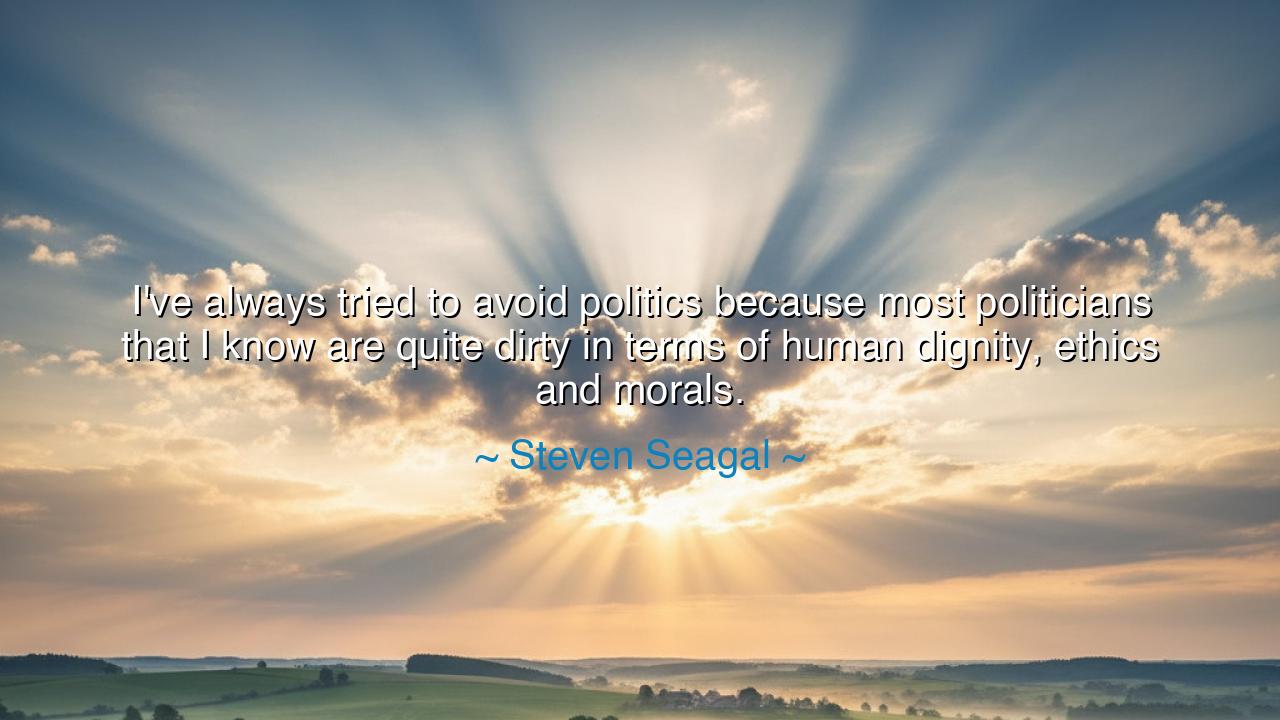
I've always tried to avoid politics because most politicians
I've always tried to avoid politics because most politicians that I know are quite dirty in terms of human dignity, ethics and morals.






When Steven Seagal declared, “I’ve always tried to avoid politics because most politicians that I know are quite dirty in terms of human dignity, ethics and morals,” his words struck like a sword cutting through illusion. He spoke of the sorrow that comes when those entrusted with the guidance of nations fall from virtue. For politics, though meant to be the art of service, too often becomes a marketplace of corruption, where human dignity, ethics, and morals are traded away for power. To avoid such realms is not cowardice, but at times a defense of the soul’s purity.
The ancients themselves warned of this truth. Plato wrote that the just man in an unjust city is like a traveler through storm and flood: if he does not guard himself, he will be swept away. Seagal’s words echo this wisdom, for the one who enters the arena of corrupted politicians risks being stained by the very filth he seeks to cleanse. Thus, his choice to keep distance is not merely disdain, but a recognition of how fragile virtue is when tested by ambition.
History bears witness to the danger of corrupted rule. In ancient Rome, the Senate once held the dignity of the Republic, but in time it became riddled with bribery and betrayal. Men like Cicero wept as morals were cast aside, and the republic crumbled into empire. So too, in countless nations, leaders who forget ethics and scorn human dignity drag their people into ruin. The decay of the few in power spreads like rot through the whole body of society.
And yet, Seagal’s words are not only a condemnation but a call to vigilance. To see the dirty truth of politics is also to remind the people of what is precious: leaders who preserve dignity, who act with honor, who guard their souls against corruption. For while power tempts, there have always been those rare few who resist, who choose integrity over gain. Their lives shine like beacons, proving that clean hands can, indeed, wield authority.
Let this teaching be remembered: beware the seductions of politics, for they are sweet upon the tongue but bitter in the soul. If you must enter such realms, do so with armor of virtue, lest you be consumed. And if you stand apart, as Seagal has chosen, let it not be out of indifference, but as a testimony that ethics, morals, and human dignity are treasures greater than crowns or thrones. For in the end, nations rise and fall—but the measure of a man is eternal.






DHDieu Hien
I totally understand Steven Seagal’s frustration with politics, but I wonder if avoiding it altogether is the right approach. His quote suggests a deep level of cynicism about the ethical state of politicians. But doesn’t that make the need for more honest and ethical people in politics even greater? Could a mindset shift, where people like Seagal actually decide to engage with politics to reform it, be the real change we need?
HDNguyen Huu Dang
It’s disheartening to hear Steven Seagal's harsh criticism of politicians, but can we really blame him? Many people feel disillusioned by the state of politics today. The problem is, when we detach from political involvement out of frustration or cynicism, how can we ever contribute to changing things for the better? Is the solution to keep pushing for reform within the system, or to give up and stay away from it entirely like Seagal suggests?
MCMinh Chau
Steven Seagal seems quite jaded about politics, and I can see why. It feels like every time you turn on the news, another politician is caught in a scandal. But here’s the thing – can we expect human dignity and ethics to be upheld in any competitive field, including politics? Is it more about the individual’s character, or do politics itself breed unethical behavior? Can it really be both, or is the system too flawed to fix?
Aaothatday123
Seagal's opinion on politics raises a big question: How much of our distrust in politicians is rooted in media portrayals versus actual personal experiences? We hear so much negativity about politics, but I wonder if we’re overlooking the rare cases of integrity. Can someone be successful in politics while maintaining high moral standards, or is it an inherently corrupt field? Wouldn't the system itself need to change for such politicians to thrive?
BCBao Chan
It’s interesting that Steven Seagal avoids politics due to his perception of politicians being 'dirty.' While it's understandable to be disillusioned by some of the actions and behaviors we see in the political world, can it be fair to generalize all politicians this way? Aren’t there some individuals in politics who genuinely aim to make a positive impact, even if the system often challenges their integrity? What makes it so easy for us to generalize about entire groups like this?